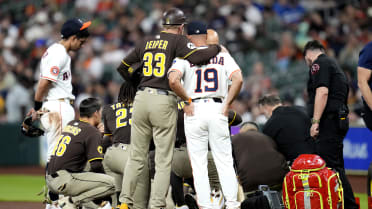Phil Rizzuto discovered a new audience in the autumn of 1978, his frantic play-by-play of a young man racing around the bases spilling out of speakers everywhere in Meat Loaf’s “Paradise by the Dashboard Light.”
The rock opera landed on the Billboard Hot 100, just as the Yankees charged toward a World Series championship -- and yes, “The Scooter” knew what he was saying.
Rizzuto frequently claimed not to have understood the innuendo behind his part in a song about teenage lovers and a parked car. Meat Loaf -- whose given name was Marvin Lee Aday, and passed away Thursday at 74 -- confirmed years later that the Yankees shortstop-turned-iconic broadcaster was very much in on the joke.
“Phil was no dummy -- he knew exactly what was going on, and he told me such,” Meat Loaf told ESPN in 2007. “He was just getting some heat from a priest and felt like he had to do something. I totally understood. But I believe Phil was proud of that song and his participation.”
Rizzuto’s contribution transformed a rock opera authored by Meat Loaf and Jim Steinman into an instant radio classic, breaking into a duet with Ellen Foley through a tempo change just after the three-minute, 30-second mark.
The broadcaster’s delivery sounds as though he’s calling the action from the press level at Yankee Stadium, describing the on-field exploits of Mickey Rivers or Willie Randolph. There’s a good reason for that -- an avid Bombers fan, Meat Loaf spent much of the summer of 1976 taking notes from Rizzuto’s broadcasts.
“OK, here we go, we got a real pressure cooker going here. Two down, nobody on, no score, bottom of the ninth. There's the windup and there it is, a line shot up the middle. Look at him go, this boy can really fly! He's rounding first and really turning it on now. He's not letting up at all, he's gonna try for second.
“The ball is bobbled out in center. And here comes the throw, and what a throw. He's gonna slide in head-first. Here he comes -- he's out. No, wait, safe, safe at second base! This kid really makes things happen out there. Batter steps up to the plate. Here's the pitch and he's going, and what a jump he's got. He's trying for third. Here's the throw -- it's in the dirt, safe at third. Holy cow, stolen base!
“He's taking a pretty big lead out there, almost daring them to try and pick him off. The pitcher glances over, winds up and it's bunted. Bunted down the third-base line. The suicide squeeze is on. Here he comes, squeeze play, it's gonna be close. Here's the throw, here's the play at the plate. Holy cow, I think he's gonna make it!”
One minor quibble: a squeeze play with two outs? In any event, Rizzuto and his agent -- former Mets outfielder Art Shamsky -- didn’t need much convincing to participate.
Rizzuto recorded his lines in 1976, in a studio at Manhattan’s The Hit Factory. His first take was stilted and flat, but Meat Loaf advised him to “just do it like it’s a game.” Meat Loaf provided an image to work off, sliding into pizza box “bases” on the floor, and Rizzuto’s subsequent takes were album-ready.
Along with “You Took the Words Right Out of My Mouth” and “Two Out of Three Ain’t Bad,” the resulting song was a highlight of Meat Loaf’s debut album, “Bat Out of Hell,” which has sold more than 43 million copies worldwide. The album was certified 14 times platinum by the Recording Industry Association of America.
“Paradise by the Dashboard Light” continued to be a staple of Meat Loaf’s act for decades, always with Rizzuto’s part spilling over the venue loudspeakers. Rizzuto would later claim that he didn’t understand the metaphor, which always brought a knowing chuckle from the song’s artist.
“Don’t believe all those stories that he came up with,” Meat Loaf told Rich Eisen in 2016. “I called him out on it at least three times with [Yankees broadcaster] Bobby Murcer on the air.”
Senior Reporter Bryan Hoch has covered the Yankees for MLB.com since 2007.




